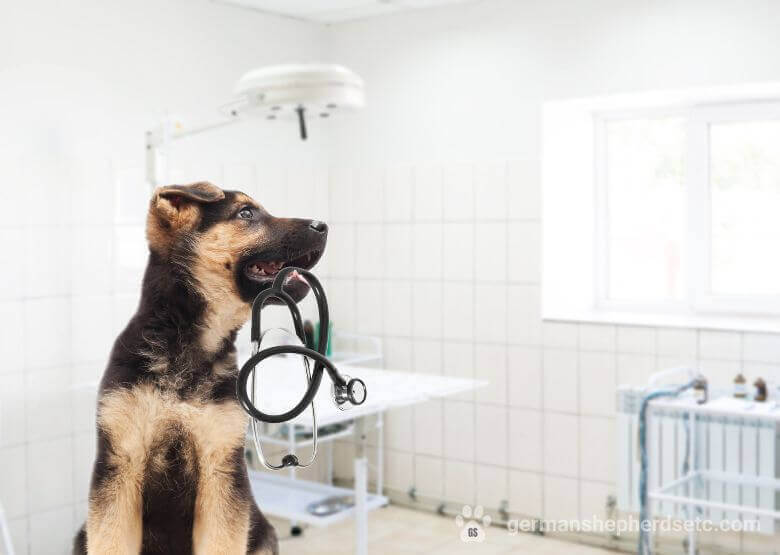Table of Contents
German Shepherds are amazing dogs with perfect guiding skills and prominent intellect. If you have decided to get one for your home, be sure that you will obtain an obedient, loyal, and reliable friend.
However, you need to know the main principles of German Shepherd puppy care to understand how to raise your dog healthy, energetic, and well-trained. Consider whether this dog breed is for you. Home conditions play a great role, so ensure that your GS puppy will feel great at your home.
Consider such things as feeding, house training, socializing, exercising, playing, bedding, teaching obedience, grooming, and medical treatment. This guide will help you to find out more about this fascinating breed and how to deal with it with less effort.
German Shepherd Puppy Care Starts with the First Minutes
You can select your German Shepherd either as a puppy from a reputable breeder or as an adult dog in a dog shelter. Remember that your relationships with your fluffy friend start with the very first minutes of your acquaintance.
Bringing a Puppy Home
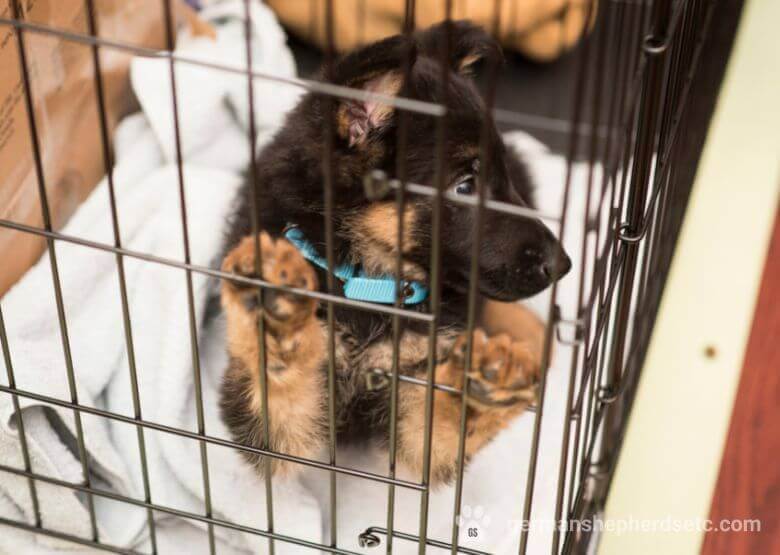
Suppose you have chosen a puppy from a breeder. Now, the first task is to bring it home. You’d better not do it alone. Bring someone with you to facilitate the task. You can use a puppy crate. So, ask your breeder to introduce the puppy to it several days before you take it home. That will reduce the puppy’s stress.
However, taking a young puppy from its mother and siblings is always a big stress. Do your best to reduce it. Don’t forget to ask the breeder about the veterinary records and the puppy’s ancestry. If it is purebred, you may need a copy of a pedigree certificate. It is important if you want your dog to participate in shows.
If you take the puppy home in a car, try to reduce the stress from new odors and experiences by letting it explore the inside of a vehicle to get used to it for a while before you drive. The puppy can start whining, so you may want to put it on your lap. However, puppies usually feel carsick and frightened, so they may make a mess. So, don’t forget to put some cloth on your lap or use a crate as a better option. If your trip is long, you may stop and let your puppy stretch and relieve itself.
Introduce a Puppy to Its New Home Gently
Now, you got home. You have already prepared it for a new tenant. This preparation should involve taking away all electrical wires, dangerous materials, tiny and sharp items, and everything your puppy can chew or swallow. Don’t forget to ask the breeder about your puppy’s food and make a stock of it alongside bowls and simple grooming tools. You will also need chew toys, and a good cleaning detergent because accidents can happen during the first days.
Learn the basics of how to care for a German Shepherd puppy before you bring it home. You may need to know how to arrange an area for sleeping, playing, and relieving. Start with introducing your little one to the potty place outside, and then bring it inside. If you have other pets, don’t let them approach the new family member at once because the puppy may feel scared. Your doggy needs to get used to its new home first. So, let it explore the room meant for its stay first.
If your puppy starts chewing furniture or house items, give it a chewing toy. Don’t shout at it or punish it in any other way. Your new friend wants to see a pack leader in you, so it is essential to take this role from the very first minute. You can do it right now because further on it may try to challenge this role. Speak calmly but firmly, call the puppy by its name, and encourage it.
Now it’s time to introduce your little dog to your family members. If you have young kids, explain to them how to deal with the doggy. Introduce other pets to it. If you have a cat, it is likely not to care much about the puppy. Your cat will just sit and observe. Though, if you have other dogs, they may show a sort of aggression. So, you may need a muzzle for your dog at first to protect the puppy. When you see that they start getting on well, you may take off the muzzle.
After that, you can feed your pup. Offer it some food that it is used to. After eating, take the doggy outside for relief. Wait for 10-15 minutes and then take it back inside. Young puppies need to be fed several times per day, and they should have a lot of drinking water in a separate bowl. Don’t forget to take your puppy outside for potty right after waking up and after every meal. It may be the start of house training.
However, accidents may happen, so do not scold or punish it. It won’t understand why you are angry. So, it’s always better to prevent these accidents. You also need to take your pup outside after every playing session. Try not to feed the doggy before it goes to bed, or you will have a sleepless night.
Your puppy needs a special place for bedding. It may be a crate or some mat in a designated part of the room. Your little dog will go to it as soon as it wants to take a nap when it understands that it is its bedding.
The First Night at Home Is Challenging
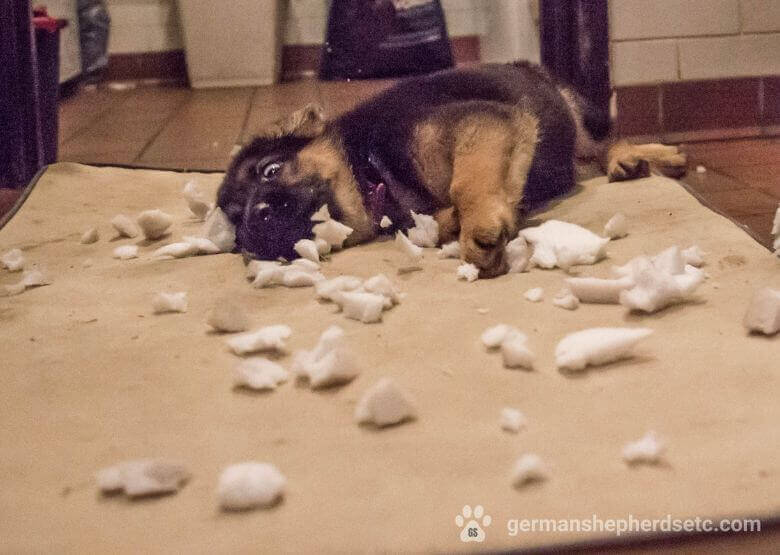
The first night in a new place is a challenging and stressful experience for a puppy. It may start crying and whining because it is a pack animal and its instincts prompt it that staying alone is hazardous. So, you need to be in contact with your little one all the time.
Avoid giving it food or drink immediately before going to bed because it will end in a mess in the room. Play with the pup for a while to make sure it is tired and ready to sleep. Take it outside before sleep and praise it if it is successful in doing its job.
Don’t take the puppy into your bed. It will be difficult to eliminate this habit in the future. The best way is using the crate. Though, keep the crate not far from you to keep an eye on the pup. You can put it in your bedroom for the first night to make it feel comfortable. Give the puppy a treat before placing it into a crate.
The puppy may want to potty at night, so take it out every three hours. Don’t let it soil the crate. You may need to take it out just once during the first nine months of age.
Taking Care of a German Shepherd Puppy by Months
Caring for a GSD will continue through its entire life. You should offer optimal conditions for health, well-being, and daily activities. Now, let’s see how to take care of a German Shepherd puppy, considering every month after birth.
Month One
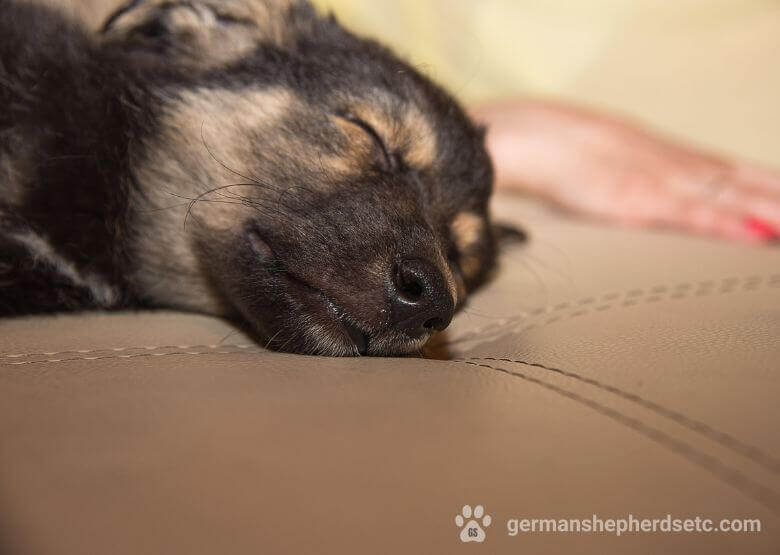
Breeders are usually fully responsible for the care of a puppy during its first month. They won’t allow it to walk outside because it is not vaccinated. There is a strong risk of infections from adult animals and people that can lead to death. The mother is responsible for hygiene. The breeder should change the bedding and check the condition of the puppy’s nose, eyes, and ears.
Responsible breeders will allow only vaccinated females for breeding, so the puppies receive protection from infections with their mother’s milk. At the age of 3-6 weeks, breeders should carry out the first deworming. If there is a risk of infections, the puppies should receive their first preventive vaccination.
More about 6 week old GSD puppy care.
Month Two
At this age, a puppy can have its new owner. Weaning from a mother is always significant stress, so if you take the puppy from the breeder, try to distract it with toys and continuous communication. Though, don’t squeeze the pet’s head during this time because there is a risk of damaging its ear cartilage.
When at home, the doggy needs a determined place for living. The ideal option is to keep it in an enclosed space with a special booth. Don’t expose it to drafts and heaters. Don’t place your puppy on the balcony or in the bathroom. When you want to keep the dog in a kennel, use straw or hay for its bedding. You can leave your pet unattended for a while during this time, but not for a long time to avoid stress. Moreover, it can start gnawing on something dangerous, get poisoned, and die.
Take care of your puppy’s eyes, ears, teeth, and hair. Do hair brushing 1-2 times a week. Do not bathe the puppy before the vaccination. Even adult German Shepherds should not be washed more than 3 times per year. If there is a need for more frequent washing, do not use shampoo. Clean the ears and teeth 1 or 2 times per month. Monitor the eyes. If some redness or tearing appears, contact the vet.
Vaccinate your puppy against plague, infectious hepatitis, parvovirus enteritis, parainfluenza, and leptospirosis at this age. Do deworming 2 weeks before the vaccination. Observe a 3-week quarantine after the first vaccination before walking outside. Do not bathe the puppy, change its diet, or do much exercise during this time.
More about 2 month old GSD puppy care.
Months Three-Six
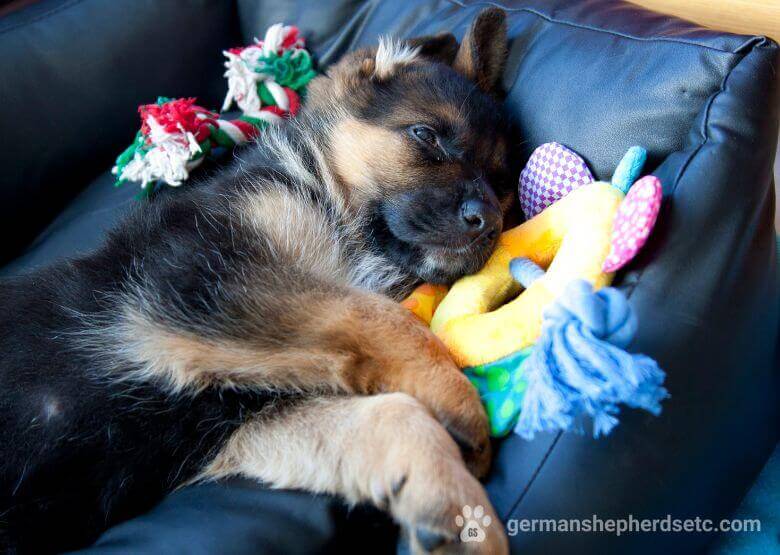
The puppy grows quickly during this time. Its limbs become longer, and the doggy is getting stronger. Start regular walking with the puppy. The first walks should be no more than 5 minutes, but at the age of 4 months, you can walk with it for 30-40 minutes already. Up to 6 months, it is advisable to walk 5-7 times a day, but when the puppy gets older, 2 long walks are enough.
Take your puppy outside in your arms for the first walks, and then offer it moderate runs and games. Take care of its musculoskeletal system from the first months. Don’t drive your puppy upstairs for up to 6 months. Don’t let it jump high and make long runs to avoid the development of pathologies of this system.
The second vaccination is needed at the age of 3 months, and the next one is after the change of teeth. The teeth change at 3-5 months, so the ears may drop down during this period because of a lack of calcium.
More about 3 month old German Shepherd puppy care.
More about 4 month old German Shepherd puppy care.
More about 5 month old GSD puppy care.
Month Six – 1.5 Years
By 6 months, the skeleton of the puppy is fully formed, and in the future, there is an increase in muscle mass. The puppy’s ears stand correctly by this age. If it does not happen, contact a specialist.
6-month-old puppies are considered teenagers, so they may display disobedience or aggression, which should be eradicated by the patience and perseverance of the owner. Taking care of a German Shepherd puppy at this age consists of walks with active games and training. Walk with a dog 2-3 times per day for 1.5-2 hours.
The third vaccination is done at the age of six months, with the preliminary deworming. Young animals are vaccinated against rabies according to the vaccination calendar.
More about 6 month old GSD puppy care.
1.5 Years Plus
At the age of 1.5-3 years, the formation of the musculoskeletal system is completed, and the young puppy grows into an adult. The dog already knows all the main commands and is mentally prepared for a special course of guard duty.
If the animal will not be used for breeding, it is recommended to sterilize the dog before 1.5 years.
At 1.5 years, the fourth vaccination is carried out. Further vaccinations are given annually 1 time per year with preliminary deworming and medical examination of the pet. Bring an adult dog for preventive examinations with a laboratory study of urine and feces annually. This measure is necessary for the early diagnosis and treatment of systemic pathologies.
Frequently Asked Questions
How can I start to teach my GS puppy obedience?
Exercise is essential for your doggy’s development, but it is important that it should learn how to obey you, of course. The basic components involve patience, reward, and an anchor. Start with the most simple things. Watch your puppy until it does some action, for example, walks, sits, and runs. Say the word associated with this action. Ask the puppy to do the action with this word. Give it a treat if it does everything correctly. Repeat doing this until the dog does it automatically after it hears the related word. Treats are essential in reinforcing the anchor commands.
How to arrange good bedding?
German Shepherds can sleep everywhere when they are about one month old. However, when they become older, they get pickier. That is why it is important to consider bed quality. As these dogs grow large, they are prone to hip dysplasia, arthritis, and other joint issues. Poor-quality bedding can reinforce these conditions. That is why talk to your vet if you want longevity for your pet.
Read the customer reviews of different brands of dog bedding manufacturers. Pick out the bedding according to your dog’s size and needs. Opt for an orthopedic dog bed to prevent joint issues.
How can I prevent separation anxiety?
Mental health is important alongside physical one. German Shepherds do not like to stay alone at any age. You are right when you are excited about separation anxiety prevention. The young dog can become distressed because it cannot cope with the separation and loneliness. That is why you must not leave your puppy alone for more than four hours or, if it is very young, for more than one hour.
If you need to leave for a longer time, ask your friends or family to call round. Or you can get a dog sitter or dog walker service. If it is an unavoidable business trip, take the little one to the doggy care. Another variant is to work from home or work flexible hours. If you can combine these solutions, the result will be perfect, and your pup will feel healthy and happy.
How to care about my puppy’s coat, teeth, nails, and ears?
The German Shepherd’s coat has two layers to protect the dog from UV rays, rain, or wind. The undercoat keeps it warm in winter. These dogs are not hypoallergenic, either. Though, they are heavy shedders, so your care for their coat is essential. Brush your puppy’s fur twice per week to make deshedding easier. Wipe its ears clean, brush the teeth, and trim the nails at least 2-3 times a year. You can ask professional groomers to do it for you.
How can I maintain vaccinations and other treatments?
You need to complete the first immunization of your puppy within 12 weeks. Follow the calendar and vet’s instructions carefully. So, you need to arrange a veterinary check-up during the first days of having your pup at home. Weight the pup monthly and check its height, too.
To do flea prevention and deworming is also essential. You should also prevent tick infestations. Do deworming every three months or two weeks before vaccinations. Follow your vet’s advice on the choice of specific preparations.
Final Thoughts
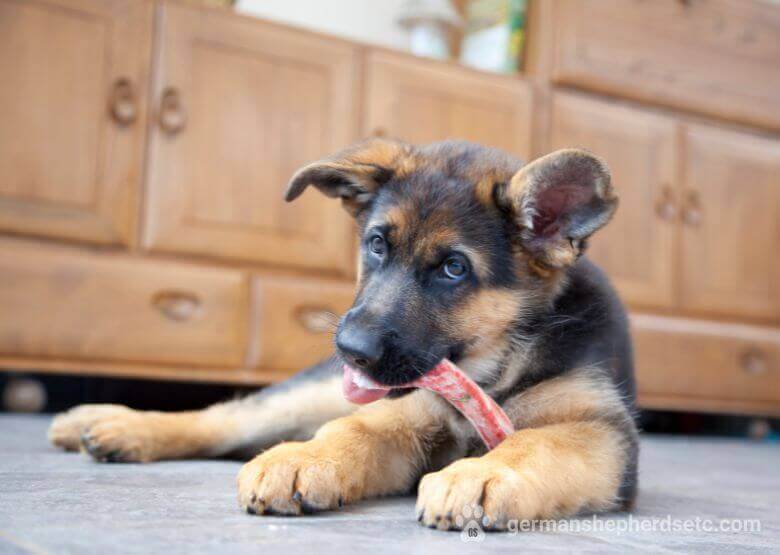
Remember that taking care of a German Shepherd puppy requires putting some time and effort into it. It may seem overwhelming and time-consuming at first. Though, if your puppy grows healthy and happy, you will feel delighted and happy too to have such a perfect companion and family member at home. Walking in the park, riding a bike, or running and laughing will become a part of your everyday routine. What can be better?
